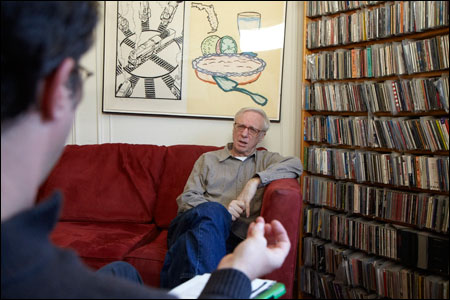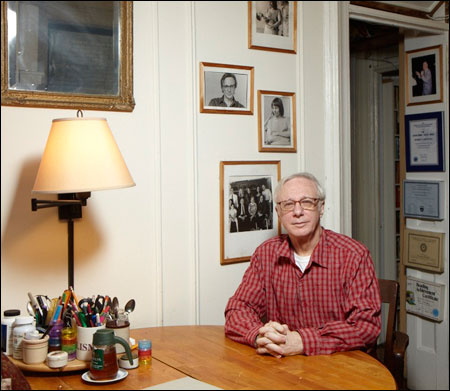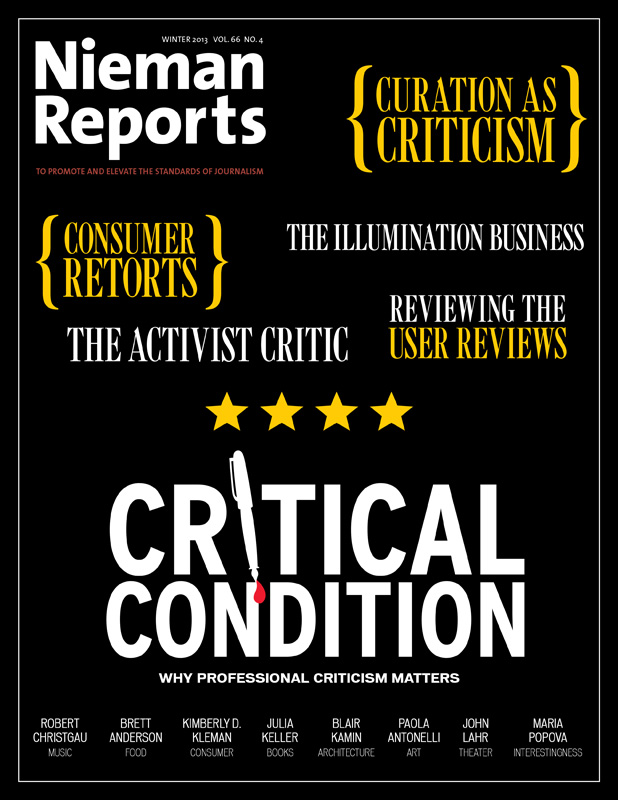
Photo by Brad DeCecco
Rock criticism was not a profession, much less an art, when Robert Christgau returned to New York after graduating from Dartmouth College in 1962, at the age of 20. The son of a Queens fireman would go on to do more than anyone to change that.
A string of freelance gigs ultimately led to a staff job at The Village Voice, where Christgau worked from 1974 to 2006.
His Rock&Roll& essays read like street dispatches filtered through the mind of an insurgent, slang-spouting academic, setting the agenda for an influential wing of rock criticism that regarded pop music as a portal to provocative intellectual inquiry.
Even more influential were Christgau's Consumer Guide columns, each comprised of pressurized, letter-graded capsule reviews that articulate—and, at their best, simulate—the excitement of the music itself.
Christgau, now 70, sat down with current Nieman Fellow Brett Anderson, restaurant critic and feature writer for The (New Orleans) Times-Picayune, at his East Village apartment to discuss his career and the state of the profession he helped create. Edited excerpts follow:
RELATED ARTICLES
Video of their conversation is available, along with an extended transcript.
BRETT ANDERSON: Bob, if we could open with you talking a little bit about how you started in this business. There's an assumption, perhaps not entirely unfair among outsiders, that people get into rock criticism because they want to hang out with rock stars.
ROBERT CHRISTGAU: That is the last thing that has ever interested me. And once I was sufficiently powerful/autonomous, because I wasn't ever really powerful, to stop doing profiles and interview pieces, I stopped doing them. It was partly just that whole hanging out lifestyle has never really appealed to me. I prefer being at home with my wife or, as [critic] Dave Hickey said, standing up in the back and telling everybody what I saw. I prefer to work as a fan. Now, of course, I'm not a fan. I have all kinds of access, all kinds of expertise, and I spend 15 hours of my day listening to music, which very few fans who are employed can possibly do or want to do. It's too much, actually, but I can do it. My test for when I write about a record is when I get that feeling in my belly that says, 'Ooh, this is really good. Ooh, I really like that one.' And if it doesn't happen, then in my view, the record is not good enough to write about.
What was the idea for the Consumer Guide?
The idea was that there is more product, let's call it, than there is space and time to write about it. This is high hippie era and the hippie movement was anti-consumption. So I decided I would call this column where I did these capsule reviews of records the Consumer Guide. And that I would do another thing that hippies weren't supposed to do and offer letter grades at a time when pass/fail was at its peak.
And both these things were quite specifically intended to get in the face of my supposed confrères in the counterculture. It was just a way to be contrarian. But it was also to acknowledge the breadth of what was there, and that has always been my interest. The idea of any record I give an "A" or above to is that, should I need to, there's enough there that I can sit there and write 1,500 words detailing it. That content is not necessarily on the surface or the reason that we listen to the record. It underlies the record.
And the first thing I care about is the brute sensual pleasure of hearing the music, which usually involves enjoyable, obviously enjoyable, surface enjoyable melodies. This has become an extremely disreputable notion in this century. I would say that most serious critics now believe that what is called an earworm [a piece of music that you can't get out of your head] is a bad thing. I like earworms.
This notion that you were going to write that short: You kind of stumbled onto a style here. Is that fair to say?
When I was first interested in journalism, I would read the Herald Trib. There were always these bits columnists; you know, witty little anecdotes about famous people, that's usually what it was. The Herald Tribune in particular really encouraged people to write with some style. And I always thought that was cool. So, the notion of trying to be epigrammatic? No, that was fine with me. Those early Consumer Guides are on my site, God help me, and I'm not especially proud of the writing in them. Because I still had this attitude, 'You're paying me 40 bucks? To hell with you.'
Could you talk a little bit about how editing a critic might be different than editing other types of journalists?
I actually don't think it is any different, so I can't do that.
Well, expand on that.
Because I think the idea is always to help the writer say what he or she wants to say as well as possible. That usually means that you let them have their own ideas. But if the ideas are patently contradictory or, in some cases, unfactual or just too stupid to abide, then you find every soft adjective, every cliché. If you see a way to say in 12 words what that person has taken 16 to say, reversing clauses or taking out a passive … Concision, always concision and clarity, even though some people would read my knottier sentences and say, What are you talking about?
What guidance can you give young people who want to become rock critics, knowing they also have to pay rent?
My professional guidance to rock critics, since before the Internet, was: Don't become one. It's a useful thing to tell people because the ones that really don't want to will fall by the wayside, and the ones who do want to will defy you and get better anyway. Of course, I'm being somewhat comic. I wasn't quite that absolute. But this is a very hard way to make a living, that's what I would tell people, especially if you want to write well, because the good stuff is getting squeezed out. And it far precedes the Internet, but the Internet just put wheels on it.
Talk about the process.
I got to do what I did because I got into the field before anybody could tell me I was wrong. I wanted to write really well. I wanted to write like myself. I wanted to have a lot of ideas. I'm interested in ideas. Some say I'm a public intellectual, but I'm not a highbrow, so...
You don't consider yourself a highbrow?
No. I don't think I have those credentials. I haven't read enough. I don't know enough. I read a lot, but I don't read as much as Harold Bloom. So I got to do all of this kind of weird stuff, and I got to be very political. I've always been very straightforwardly left leaning/leftist in my criticism. I make moral judgments. I moralize, which you're not supposed to do. I do it, as well as being sometimes very unkind, vulgar, highbrow in diction. I use academic words, and I say 'fuck' a lot. At the Voice, I could do both of those things. Most places, you can't do either. I always did what I believe artists should do. Why is popular culture good? Is it good because the formulas are good? Well, sometimes the formulas are useful. However, formulas tend to be deadening. What usually happens in the best art is that somebody pushes the formula in some way, the envelope, as is now the cliché. I always kept my eye on people who I felt were working within the form but stretching the form. I thought that was the ideal for myself as well. Push the formula.
Of criticism?
Of criticism. Do what you can. Get away with what you can. I do a lot with tone. I sometimes assume a vulgar tone, just to piss people off. Or to juxtapose it with something entirely different.

Photo by Brad DeCecco
I just got back from South Africa. I did a lot of driving around there, and when the road got long, my wife would read to me. One of the things I asked her to read to me was your piece about Paul Simon's "Graceland" from 1986.
Oh, I'm so touched.
And as it happens, she loves Paul Simon. "The Indestructible Beat of Soweto" is one of the best pieces of music I ever heard, and it's thanks to you I got turned onto it as a teenager. And so she read me this piece about "Graceland" that you wrote. And in it, you interviewed Paul Simon and at least a dozen people who were associated with South Africa in some way who might have an opinion. The amount of effort that went into that was very obvious.
It was a reported piece, a reported critical piece. I'm a political person. So if I'm going to write directly about a political subject, that is something I'm going to take very seriously, indeed. I don't believe in mouthing off. I believe in doing your research. I'm really not one of these spouters. I'm never going to be on Twitter, ever.
Why not?
Because I don't spout, because I rewrite. And Twitter is not a rewriter's medium. It's a place where people say stupid things.
Twitter offers a segue into talking about the economics of journalism and how it affects critics. I'm ensconced at Harvard this year around a lot of conversations about business models. You can find people who will argue this particular period of time in journalism is a good thing for journalists, for journalism, for readers. And the reason would be ...
Oh, really? They think that the market should get what it wants. OK. No.
The market should not get what it wants?
No, the market exists to be fucked with. When I say push the envelope, when I say push the parameters, when I say pop forms are good for people, that's the market, right? So what do I do with the Consumer Guide? I gave them, early on, brevity and some laughs. That was the idea. What did I get to do? I get to tell people that their favorite artist was full of shit. I got to express ideas that were not popular ideas. And I was working in a newspaper [The Village Voice] which at that time was conceived to do that very thing, to serve a market, get advertising, but put out provocative and unconventional opinions. Moreover, what publishers are there to do is to tell you what the market wants. What editors are there to do is to protect you from publishers, and try to get you to do good work. Then there's also the question of advertising, and the limitations of basing your journalistic business model on selling advertising. That's the way the Internet has really killed us.
But the other way the Internet has killed us is that it has reduced the value of the written word, the cash value of the written word, because there are more of them and because there are certain people who are so eager to spout that they will happily do so for free or almost nothing. While many of them are crap, that doesn't mean they are not going to siphon off a great many readers. Most people who buy the newspaper do not buy it to read the movie reviews. That has never been true.
So why should publishers publish criticism if people don't buy the publications to read criticism?
Because they care about good writing. I work for the Barnes & Noble Review these days, and Barnes & Noble used to be a bête noire among book lovers because they were killing the independent bookstore. I'm a socialist. But does that mean I think capitalism is bad? No. I always tell my socialist friends rock 'n' roll would not have happened without capitalism. It is a capitalist form, and it's [one of] the best things about capitalism. Being socialist doesn't mean there's nothing good about capitalism, far from it. But I will tell you one thing I really like about capitalism: The people who make things and really care about what they make. And the guy who owns Barnes & Noble cares about books. Similarly, the people who own magazines and newspapers should care about words.
When you're writing your Consumer Guide or Expert Witness reviews, beyond turning people onto cool, new music, what are you trying to do?
Well, the main thing I'm trying to do is to write well. That's number one.
Which means you're entertaining and stimulating people.
That's right, and pleasing myself. I like to look back on my own reviews and say, 'Oh, that was a good line.'
You do read your own stuff?
Absolutely. It's good. Why not? It reminds me of what I can do. It reminds me of things I thought that I forgot. It's very useful sometimes. It can really be inspirational, too, when you're stuck on something.
Yeah, I do that. A lot of criticism that I read, that I don't find as enlightening as I'd like it to be, it's personal, but it's only personal, and there's nothing else to it.
Yes. There's a lot of that. That's definitely a blog-era phenomenon. It's not that it didn't exist before, but it's the lingua franca of the blog era.
Talk a little bit about how you use the personal in writing, without tipping over into this phenomena you're talking about. I reread a piece you did about Thelonious Monk back in '09, about first listening to "Misterioso."
That's a good one, but that one was exceptional in that respect. It began with a few tales from my youth. I don't usually do that. With jazz, I feel a necessity to deflate my authority a little bit. It's the reason I began with those personal things, because I know I don't have the authority in jazz.
In any case, what do I tell people? First, figure out what records you really like, then figure out why you really like them, both of which are difficult things to do. Not what you should like, not why you should like it. What is it that's actually giving you pleasure about this record? I've got to get that feeling in my stomach before I go to the next place. What gave you that feeling in your stomach? Then figure out a way to explain that clearly. Now, none of that answers your question. That sounds like it's completely personal. So what's the answer? In the case of an artist who is not familiar, you have an obligation to situate that artist in the world. That's especially true with world music, but it's true with a lot of young bands. You want to know where they come from, how many of them there are, what they play.
Writing a capsule could take a long time. Sometimes, it just sort of comes to you. You sit there, and you wait, and you listen, and you listen, until some detail or word or turn of phrase or joke that's new, that's original to this specific instance, comes to your mind, and you build off of that. Usually, you need two to make a capsule. If you care about good writing, and you've reviewed 13,000 records in your life, you want to try...
Is that where your number is?
Yeah, it's somewhere over 13,000. You want to try not to repeat yourself, and that obliges you to find a different way to express something. My guess is that impression you get of my objectivity is partly tied up in that need to specify.
There are many more hours of music released in a year than there are hours in a year. How do you, as a critic, budget your time wisely under these circumstances?
For one thing, I don't listen to singles. I'm not interested in Web-based music, except insofar as it's recommended to me, so that I only write about CDs that I actually get in the mail or that reading about them encourages me to download from Rhapsody and put on my Sansa player and play and then decide it's good enough to go buy. I don't do what the MP3 bloggers do. And I don't have this daily need to find a song I love to pieces and will forget existed three days later.
Can you talk a little bit about how age impacts your work? Rock 'n' roll is considered a young man's game.
It's not. An enormous number of really good records are being made by people over 50, 60 and even 70. Because it was once the music of youth, it is now the only popular music that I know of that's ever really addressed aging as a major issue in one's life, the only one. It's not the music of youth. In fact, for various formal reasons, good records by people under 30 are becoming more and more unusual. That's because, I think, the creative part of that subculture is caught in the contrarian mindset to which I referred before, and is making stuff that isn't something else. And that's a much harder way to make something good. Not impossible, but harder. Not a good place to start, with the negative.
Can you ever imagine being alive and not reviewing records?
Sure.
You can?
Absolutely. If somebody isn't going to pay me, I'm going to stop. And somebody will stop paying me eventually, I assume, maybe, probably.
You've got 15 hours a day of listening to music. You write seven days a week. Do you think it's a reasonable thing to expect that someone else would follow in your footsteps?
No, I don't see how. My fear about criticism in general is that it's gonna turn into an amateur's game again, the gentleman amateur. The original critics were gentlemen amateurs. And that really sends me. I think it should be a job. I think you should get paid for it. And I think that you get different kinds of people when you get gentlemen amateurs, with different standards. I think you're better off with an editor. I think you're better off with a format. For all the problems I have with the way the dailies do things, I think it's something to stretch against and to try and figure out how to do right. But, you know, it's not practical. I'm very lucky. I'm fortunate. And, you know, it's quite possible that nobody will ever do anything like this again.



